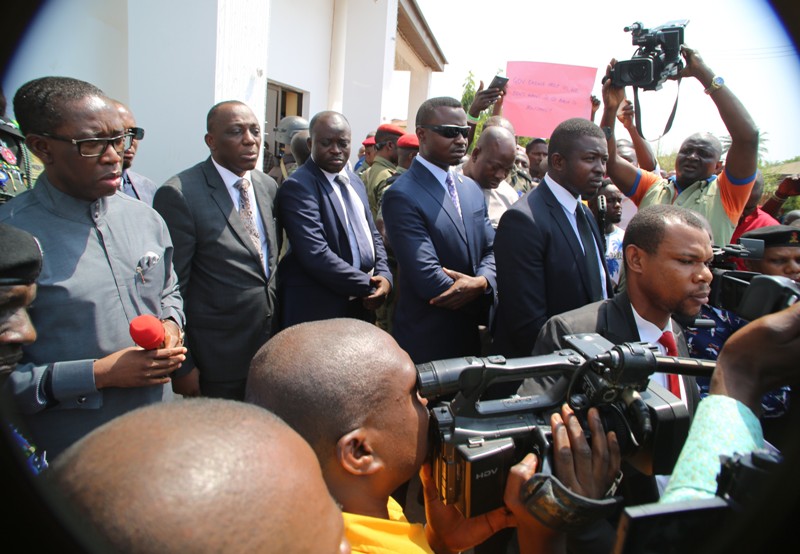Barely One year and a half after his appointment as the Group Managing Director of the Nigerian National Petroleum Corporation (NNPC) by President Muhammadu Buhari, Mele Kolo Kyari has succeeded in enshrining a new system that operates along with well-defined operational processes, benchmarked against established global best practices by world-class oil and gas companies.He succeeded Maikanti Kachalla Baru (now late) on Monday, July 8, 2019 as the 19th Group Managing Director of the Corporation.Prior to his appointment, Kyari, a Maiduguri-born Petroleum Engineering graduate from Bornu State was the Group General Manager in charge of the Crude Oil Marketing Department (COMD). He has worked with the NNPC and the Nigerian oil and gas industry for over 33 years.The Borno-born Oil and Gas magnate has left visible footprints of achievements across all segments of the country’s petroleum industry – Upstream, Downstream, Gas & Power as well as his interventions in other sectors to give Nigerians a new lease.A 1987 Bachelor of Science (B.Sc) degree holder in Geology and Earth Science from the University of Maiduguri, Kyari did his National Youth Service Corp (NYSC) as a Well Site Geologist with the Directorate of Foods, Roads and Rural Infrastructure (DFRRI) between 1987 and 1988.Between 1988 and 1991, he worked with the Nigerian Geological Survey Agency before joining the NNPC subsidiary, Integrated Data Services Limited (IDSL), where he worked as a Seismic Data Processing Geophysicist in the Data Processing Department.In 1998, Mr Kyari was appointed the Exploration Geophysicist Production Sharing Contract (PSC) of the National Petroleum Investments Management Services (NAPIMS) until 2004 when he became the Abuja Operations Manager of NAPIMS.Established on April 1, 1977 as Nigeria’s national oil company, the NNPC has been living in the dark shadows of monumental corruption and opacity; a place perpetually lagging behind its peers in other climes; where nothing is done properly to the benefit of its major shareholders.The Nigerian National Petroleum Corporation is the oil corporation through which the federal government of Nigeria regulates and participates in the country’s petroleum industry. The NNPC business operations are managed through Strategic Business and Corporate Services Units (SBUs/CSUs) in diverse locations across Nigeria. In that case; The Nigerian National Petroleum Corporation (NNPC) initiated a recruitment scheme and since then, until date the NNPC recruitment has been a yearly scheme.NNPC was established as a merger of the Nigerian National Oil Corporation and the Federal Ministry of Mines and Steel. NNPC by law manages the joint venture between the Nigerian federal government and a number of foreign multinational corporations, which include Royal Dutch Shell, Agip, ExxonMobil, Total S.A, Chevron, and Texaco (now merged with Chevron). Through collaboration with these companies, the Nigerian government conducts petroleum exploration and production. In 2007, the head of the Nigerian wing of Transparency International said salaries for NNPC workers were too low to prevent graft. The NNPC Towers in Abuja is the headquarters of NNPC. Consisting of four identical towers, the complex is located on Herbert Macaulay Way, Central Business District Abuja. NNPC also has zonal offices in Lagos, Kaduna, Port Harcourt and Warri. It has an international office located in London, United Kingdom. In October 2019, NNPC stated that it had signed a $2.5 billion pre-payment agreement with Nigeria LNG for upstream gas development projects. However, Kyari inherited an NNPC that was living in a shadow of its old self, the corporation over successive years has been bewitched by a negative image of a national oil company where nothing works; and where corruption was the order of the day. Therefore, there was a pertinent need to open a new vista for the Corporation. A geologist, Mr Kyari is known in the oil industry as a crude oil marketer with outfield pedigree in petroleum economics and crude oil and gas trading. He was a known trailblazer whose indelible marks were felt at every sector he manned.With over 32 years of experience in the oil and gas industry, his tour of duty traversed the entire value chain of the petroleum industry.At NNPC, he initiated an agenda he called it the Transparency, Accountability and Performance Excellence (TAPE), a five-step strategic roadmap for NNPC’s attainment of efficiency and global excellence. TAPE became the only way to transform the NNPC and enhance its potential and capacity to compete with other national oil companies around the world.Through his influence and authority, NNPC opened up its systems to public scrutiny. This subjected its operational processes to transparency and accountability.Kyari was instrumental in bringing normalcy to the Nigerian Petroleum Development Company (NPDC), the upstream exploration and exploration subsidiary of the NNPC. According to a Tier A tabloid, it was learnt that for years, the company has been struggling to grow its output capacity to about 250,000 barrels per day. Disputes by Niger Delta communities hosting some of its key oil fields frustrated its efforts, as its workers were denied access to critical oil fields.Following his intervention, all the issues were amicably settled. The traditional injunction that stopped oil production at the OML-25 oil flow station was removed.Since he assumed office, President Muhammadu Buhari has never interfered in the affairs of the corporation since he became president in 2015.Kyari has led the oil and gas industry’s effort to support the government to limit the dread of the deadly Coronavirus pandemic in Nigeria.He provided leadership to the decision to establish Petroleum Industry Intervention Fund on which platform the oil and gas industry mobilized about N21 billion to support the finance the provision of medical facilities and other interventions to curb the spread of the virus in the country’s six geo-political zones.Kyari’s leadership has opened up the system a bit; a foundation successive administration will build on to bring more value to Nigerians.




